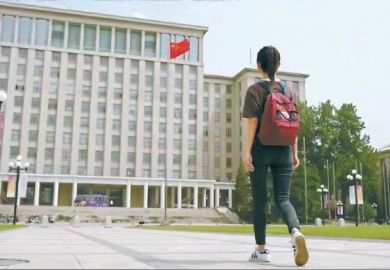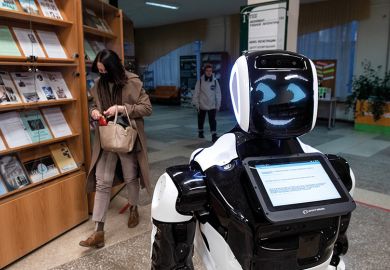While most academics have got used to the advantages and pitfalls of taking their classrooms online in recent years, the idea that a field trip could equally be replicated in a virtual space may be a little harder to fathom.
But with the help of his mobile phone, a Go-Pro camera, large amounts of data and – at times – his bicycle, Charles-Antoine Rouyer has been able to do just that as part of his urban ecology and urban health course at Canada’s York University.
First driven by necessity due to lockdown restrictions, he now believes the methods he has devised can be used to provide access to sites where student numbers are restricted or to help remote learners and those with disabilities experience field trips they may otherwise have had difficulties accessing.
“When fall 2020 came around, like everybody else I was bored teaching in front of my screen and I just wanted to get outside,” said Professor Rouyer, course director in multidisciplinary studies at York’s Glendon College.
“The course I had been teaching for 17 years had two field trips. The learning experience was so important for the students, I thought I needed to find a way to get this activity through despite the barriers of being online.”
Initially, Professor Rouyer headed out with his mobile phone, visiting parks and green spaces throughout the city of Toronto to illustrate different elements of urban ecology for his students watching at home.
He eventually applied for an internal academic innovation fund grant from his institution and was awarded C$5,000 (£3,200) to buy more equipment, which allowed him to incorporate his idea into the design of a new course for summer 2021 and turn 12 out of 24 of his lectures into online field trips. This course was offered again in summer 2022 in a hybrid format, so students could attend field trips in person or via live streaming.
“As a former journalist, I recalled the power of being live as opposed to pre-recorded. I could have gone out and filmed videos of the site visits, but I wanted the students to be able to tune in, watch live and be able to interact,” he said.
Professor Rouyer said he was encouraged to try out the idea during the pandemic because it was a time of experimentation. “If I fall flat on my face, the students will probably be forgiving for having tried something different,” he said.
He described his role as being like a tour guide but said he also felt like an octopus, requiring multiple arms at times while juggling bits of equipment and streaming platforms.
Professor Rouyer doesn’t believe that remote mobile field trips will ever be as good as being there in person – and describes it as being a bit like black-and-white TV versus colour – but says it is still better than nothing, and students seemed to get quite a lot out of the online experience.
Another professor who read about the original pilot has already reached out for technical details and tried it herself. In an ideal world, he thinks institutions could create live-streaming kits that academics could check out from the library, in the form of a backpack with all the equipment and the data plan that’s needed.
POSTSCRIPT:
Print headline: Live-stream field trips an answer to access issues, says professor
Register to continue
Why register?
- Registration is free and only takes a moment
- Once registered, you can read 3 articles a month
- Sign up for our newsletter
Subscribe
Or subscribe for unlimited access to:
- Unlimited access to news, views, insights & reviews
- Digital editions
- Digital access to THE’s university and college rankings analysis
Already registered or a current subscriber?




